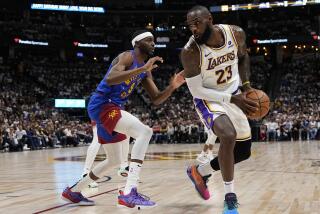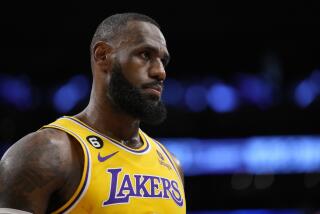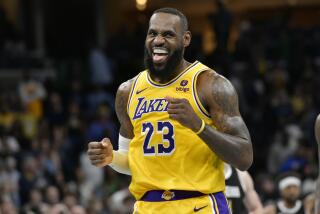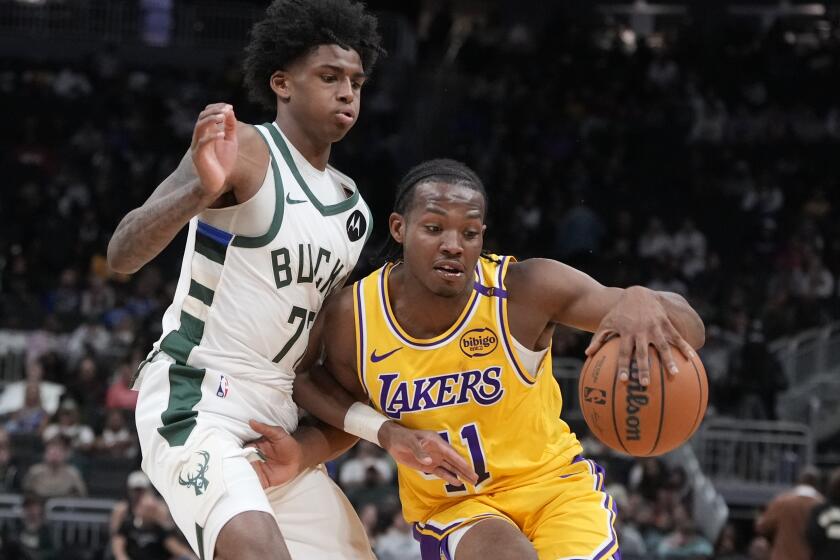It’s Back to Business for NBA : Pro basketball: Owners approve collective bargaining agreement by a 25-4 vote. Lockout will end Monday.
Another day, another NBA vote, another lopsided victory.
And now, finally, another season.
What had been a foregone conclusion became official Friday, when the league announced that its owners had also voted overwhelmingly by telex, 25-4, to ratify the collective bargaining agreement.
Coming on the heels of announcements earlier this week that players and team player representatives had supplied equally decisive victories, the owners’ vote cleared the way for the lockout to be lifted Monday.
The Lakers and Clippers both voted in favor of the six-year deal.
“I believe the players certainly got far and away the better of the deal, but I am first and foremost a basketball fan and therefore could not accept losing the season,” Laker owner Jerry Buss said. “I think the fans understand that this is in everybody’s best interest.”
The lockout that began July 1 will last through the weekend only as a formality. League officials decided to make 9 a.m. PDT on Monday an official starting time for the pursuit of free agents and trades.
Soon after, the Clippers will announce that they have dealt Elmore Spencer to the Denver Nuggets for Brian Williams, a deal consummated on draft day as part of the larger Rodney Rogers-Antonio McDyess swap. Others--including Otis Thorpe from Portland to Detroit and B.J. Armstrong from Toronto to Golden State--will follow.
And after that, new business.
“We think that trading activity is pent up and is going to explode, especially involving the expansion teams,” Commissioner David Stern said. “Free-agent movement, because of the size of the cap [up from $15.9 million to $23 million], we think is also going to be brisk compared to past years.”
Too bad the talent won’t be worth the wait. Anthony Mason, the reigning “Sixth Man of the Year,” heads a list that includes mostly reserves or unspectacular starters.
Even the anticipated rookie signings aren’t expected to provide much drama. The new scale for first-year players determines the salaries and leaves only a small window for negotiations, which should eliminate protracted holdouts.
But at least there will be some movement, providing a running start for the opening of training camps Oct. 6.
“If you look at it from a standpoint of a [lack of] summer camp, the individual work for [Stanley] Roberts, it’s too much you can’t get back,” Clipper Coach Bill Fitch said. “But that’s behind us. Now we’ve got to see how much we can play catch-up and see how much we can get back in the next two weeks.”
Said Jerry West, the Lakers’ executive vice president: “It kind of feels good that we can go back to work. We’ve been locked in a cage now since July 1, so it really sort of feels nice that, finally, Monday means business as usual.”
Players who pushed for decertification of the union, however, may continue their fight. Jeffrey Kessler, the lawyer for the dissidents, said he probably won’t decide until Monday or Tuesday whether to challenge the results of the election.
Tuesday is the last day objections can be filed. Stern realizes that Kessler might be able to find at least one player willing to continue the challenge, but said the deal originally reached Aug. 8 would stand up to legal scrutiny.
Times staff writer Chris Baker contributed to this story.
(BEGIN TEXT OF INFOBOX / INFOGRAPHIC)
Labor Terms
--A cap will be placed on rookie salaries based on the average salaries received by the picks at each position over the previous seven years, with allowance for a 20 percent raise. Rookie contracts will be limited to three years, after which a player would become an unrestricted free agent.
--Players will receive revenues from several sources not included in the previous agreement, including money from luxury suites, parking, concessions, international television rights and advertising signs in arenas.
--The salary cap will rise from $15.9 million last season to $23 million in 1995-96. By the end of the agreement, the 2000-01 season, the cap would be $32.5 million, assuming league revenues grow by 8 percent.
--Minimum salaries, currently $150,000, will rise to $362,000 by the final year of the agreement.
--Clubs will still be allowed to re-sign their own free agents without regard to salary cap limitations as long as they’ve completed a three-year contract. After two years, players also can re-sign for a 75 percent raise or the average league salary, whichever is greater.
--Other cap loopholes include a $1 million slot, which can be used for one or two players regardless of whether the team is over the cap. Also, a team may replace an injured player for 50 percent of that player’s salary.
--Players may extend their contracts for raises of no more than 20 percent. Large “balloon payments” tacked on to the end of contracts are prohibited.
--Contracts may not be renegotiated downward.
--After the first three years of the agreement, the college draft will be reduced from two rounds to one.
More to Read
All things Lakers, all the time.
Get all the Lakers news you need in Dan Woike's weekly newsletter.
You may occasionally receive promotional content from the Los Angeles Times.









